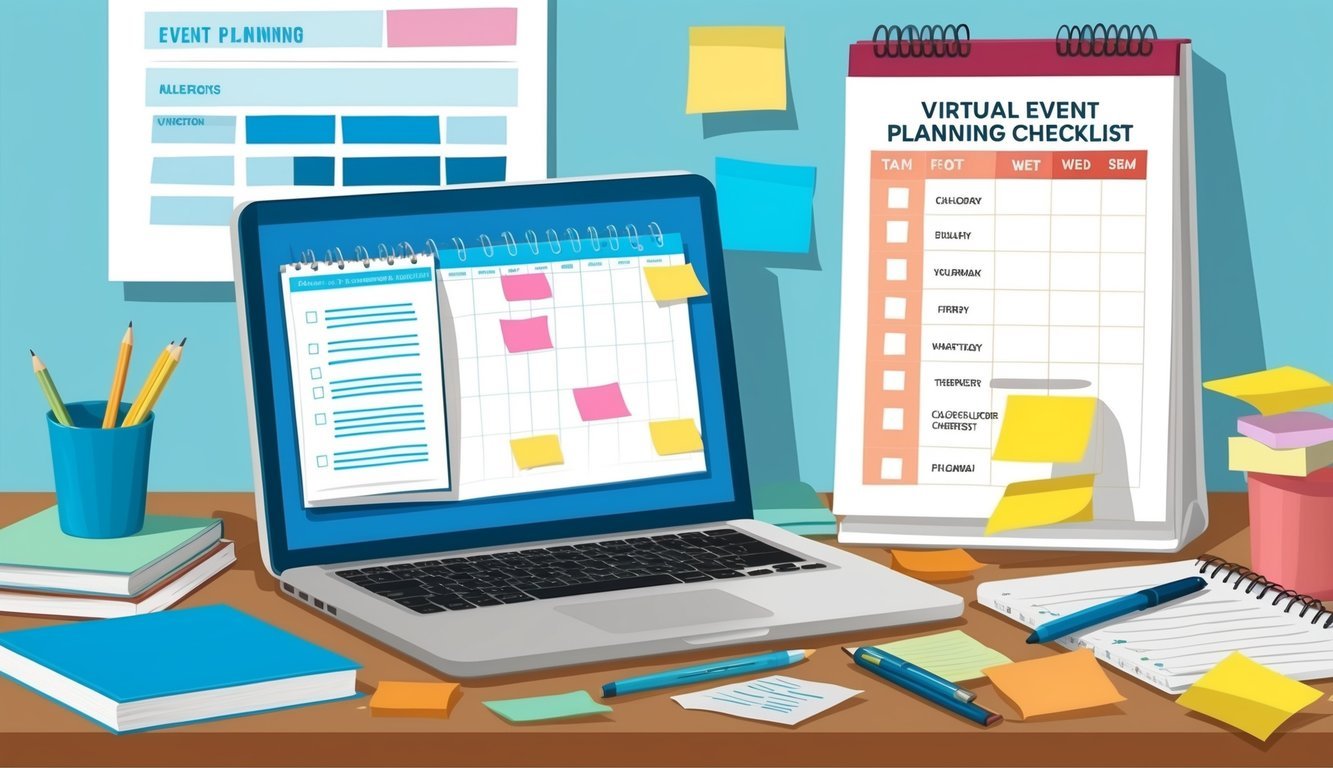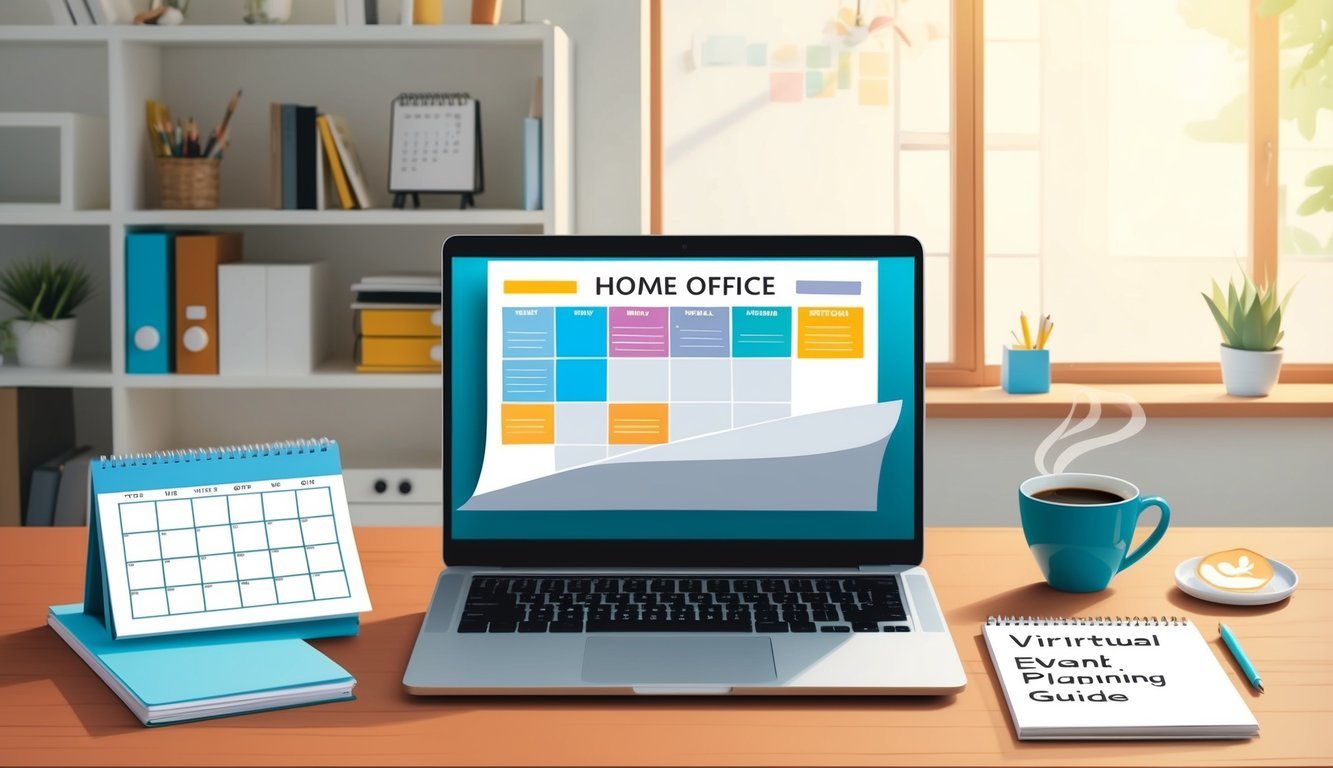Our increasingly digital world has made virtual event planning an exciting and profitable side hustle opportunity.
The demand for skilled virtual event planners has skyrocketed due to the rise of remote work and online gatherings. Virtual event planning is an ideal side gig for those looking to supplement their income or transition into a new career.
You can start your own virtual event planning business with minimal upfront costs and flexible hours.
Virtual event planning includes various activities, from organizing online conferences and webinars to coordinating virtual concerts and social gatherings.
As a virtual event planner, you’ll leverage your creativity, organizational skills, and tech-savvy to create memorable experiences for clients and attendees.
Whether you’re passionate about corporate events, educational seminars, or entertainment showcases, there’s a niche waiting for you in this rapidly growing field.
To get started, focus on honing your skills and building a portfolio of successful virtual events.
Attend online conferences and workshops to stay up-to-date with industry trends and best practices.
Invest in reliable technology and software to ensure smooth event execution.
As you gain experience and build a reputation, you can expand your services and potentially turn your side hustle into a full-time business.
Key Takeaways
- Virtual event planning offers a low-cost entry into a growing industry with flexible work hours
- Develop your skills by attending online events and investing in reliable technology
- Start small and expand your services as you gain experience and build a strong reputation
Exploring the World of Virtual Event Planning
Virtual event planning offers exciting opportunities for a flexible side hustle.
You can tap into a growing market while working remotely and leveraging cost-effective online platforms.
Evolution from Traditional to Virtual Events
The events industry has undergone a dramatic transformation in recent years.
Traditional in-person gatherings have given way to virtual experiences.
This shift accelerated during the global pandemic, creating new opportunities for aspiring event planners.
You no longer need a physical venue or elaborate decorations.
Instead, your focus is on creating engaging online experiences.
Virtual platforms now offer features like breakout rooms, networking lounges, and interactive polls.
The skills you’ll need have evolved too.
Technical know-how is crucial, but so is understanding how to keep online audiences engaged.
You’ll need to master the art of digital engagement and seamless online coordination.
Understanding Types of Virtual Events
Virtual events come in many forms.
You might organize webinars, online conferences, or virtual trade shows.
Each type requires a unique approach.
Webinars are typically shorter, focused sessions.
They’re great for educational content or product demonstrations. Virtual conferences can span multiple days, featuring keynote speakers, breakout sessions, and networking opportunities.
Virtual trade shows recreate the exhibition hall experience online.
Attendees can visit virtual booths and interact with exhibitors.
Other options include:
- Online workshops
- Virtual team-building events
- Digital product launches
Your job is to match the right format to your client’s goals and audience preferences.
Advantages of Virtual Events for a Side Hustle
Virtual event planning is an ideal side hustle because it offers flexibility and the ability to work from anywhere.
You can start small and scale up as you gain experience.
Cost-effectiveness is a major advantage.
You’ll save on venue rentals, catering, and travel expenses.
This allows you to offer competitive pricing to clients while maintaining good profit margins.
Online platforms provide powerful tools at your fingertips.
Many offer all-in-one solutions for ticketing, attendee management, and event hosting.
This simplifies your workflow and reduces the need for multiple software subscriptions.
You can easily expand your reach beyond local markets.
Virtual events allow you to work with clients and attendees from around the world.
This global potential can significantly boost your earning potential as a side hustler.
Key Skills and Tools for Event Planners
Successful virtual event planning requires a combination of essential skills and cutting-edge tools.
You’ll need to master specific abilities and leverage technology to create memorable experiences for attendees.
Essential Event Planning Skills
As a virtual event planner, you must develop strong organizational and communication skills.
You’ll need to juggle multiple tasks, deadlines, and stakeholders simultaneously.
Attention to detail is crucial – even small oversights can impact the attendee experience.
Creativity is key in designing engaging virtual events.
You should be able to think outside the box and come up with innovative ideas to keep participants interested.
Adaptability is also vital, as you’ll often need to make quick decisions and solve problems on the fly.
Developing your networking abilities is essential.
Building relationships with vendors, speakers, and industry professionals can open up new opportunities and help you create better events.
Project Management and Collaboration Tools
To stay organized, you’ll want to use project management tools.
Platforms like Trello, Asana, or Monday.com can help you track tasks, deadlines, and team responsibilities.
For seamless collaboration, consider using:
- Google Workspace for document sharing and real-time editing
- Slack or Microsoft Teams for instant communication
- Zoom or Google Meet for virtual team meetings
These tools will help you coordinate with team members, vendors, and clients efficiently, ensuring everyone stays on the same page throughout the planning process.
Leveraging Event Planning Software
Event management software is crucial for streamlining your virtual event planning process.
Look for platforms that offer:
- Registration and ticketing systems
- Virtual event hosting capabilities
- Attendee engagement features (polls, Q&A, chat)
- Analytics and reporting tools
Popular options include Eventbrite, Hopin, and Cvent.
These platforms can help you create professional-looking event pages, manage registrations, and host engaging virtual conferences.
Remember to stay up-to-date with the latest event technology trends.
Familiarize yourself with virtual reality and augmented reality tools that can enhance attendee experiences and set your events apart.
Developing Your Side Hustle Business Model
Creating a solid business model is crucial for your virtual event planning side hustle.
It will help you define your services, set competitive prices, and stand out in the market.
Pricing Strategies for Your Services
When setting your prices, consider the complexity and duration of each event.
For a shorter webinar with up to 500 participants, you might charge between 2,500 and $10,000.
A single-day virtual conference could range from $4,000 to $25,000.
Factor in your time, expertise, and the tools you’ll need.
Don’t forget to account for hidden costs like software subscriptions or additional staff.
Consider offering tiered pricing options.
This allows clients to choose the level of service that fits their budget.
For example:
- Basic package: Event coordination and platform setup
- Premium package: Full event management, including marketing and post-event analysis
Building a Profitable Side Hustle
To make your side hustle profitable, focus on efficiency and scalability.
Invest in reliable event planning tools that can handle multiple aspects of your business.
Set aside specific “business hours” for your side hustle.
This helps you manage your time effectively and maintain a healthy work-life balance.
Network with other professionals in the industry.
Attend virtual events and conferences to stay updated on trends and make valuable connections.
Consider partnering with other service providers, like graphic designers or videographers.
This can help you offer more comprehensive packages without increasing your workload.
Crafting Your Unique Value Proposition
Your value proposition sets you apart from competitors.
Think about what makes your virtual event planning services unique.
Do you specialize in a particular industry or type of event?
Highlight your strengths.
Are you tech-savvy? Do you have a knack for creative themes? Maybe you’re excellent at managing large-scale conferences.
Be ready to clearly explain what you do, why you do it, and who you serve in a concise manner.
Tailor your services to meet specific client needs.
For example, you could offer custom virtual backgrounds or interactive elements that enhance attendee engagement.
Marketing and Promoting Your Virtual Events
Effective marketing and promotion are crucial for the success of your virtual events.
By leveraging various channels and strategies, you can attract more attendees and boost engagement.
Effective Use of Email Marketing
Email marketing remains a powerful tool for promoting virtual events.
Start by building a targeted email list of potential attendees.
Craft compelling subject lines to increase open rates.
In your emails, highlight the unique value proposition of your event.
Consider creating a series of emails leading up to the event date.
Include teasers, speaker spotlights, and early bird discounts to generate excitement.
Personalize your messages based on recipient interests or past event attendance.
Use automation to send reminders as the event approaches. Timing is crucial – send a final reminder 24 hours before the event starts to maximize attendance.
Social Media Management and Content Marketing
Leverage social media platforms to create buzz around your virtual event.
Choose platforms where your target audience is most active.
Create eye-catching visuals and short video teasers to share across channels.
Develop a content marketing strategy to support your event promotion.
Write blog posts or create podcasts related to the event topic.
This helps establish your expertise and generates interest.
Use event-specific hashtags to increase visibility and encourage attendees to share.
Consider running contests or giveaways to boost engagement and reach.
Affiliate Marketing for Event Promotion
Affiliate marketing can significantly expand your reach.
Partner with influencers, industry experts, or complementary businesses to promote your virtual event.
Offer them a commission for each attendee they bring in.
Provide your affiliates with promotional materials like banners, email templates, and social media posts.
This makes it easier for them to share your event with their audience.
Track affiliate performance using unique links or promo codes.
Reward top-performing affiliates to encourage ongoing promotion.
Consider offering tiered commission structures to incentivize higher sales.
Curating Engaging and Memorable Virtual Events
Virtual events require careful planning and creative elements to captivate your audience.
Compelling content, interactive features, and unique experiences are key to making your online gatherings stand out.
Creating Engaging Content
Start by developing content that resonates with your audience.
You’ll want to focus on topics that are relevant and valuable to your attendees.
Consider hosting an interactive workshop where participants can learn new skills or gain insights from industry experts.
Think about incorporating visual elements like infographics or short videos to break up text-heavy presentations.
These can help maintain attention and improve information retention.
Don’t forget to include opportunities for audience participation.
You might try:
- Live polls
- Q&A sessions
- Group discussions
These elements keep attendees actively engaged rather than passively watching.
Interactive Elements to Boost Engagement
To make your virtual event truly memorable, you need to go beyond basic presentations.
Consider adding interactive elements that encourage participation and create a sense of community among attendees.
Virtual breakout rooms are great for small group discussions or networking.
You can also incorporate gamification elements like quizzes or scavenger hunts to make the event more fun and engaging.
Think about hosting a virtual concert or talent show as part of your event.
This provides entertainment and a creative outlet for attendees, making the experience more enjoyable and memorable.
Ensuring a Memorable Virtual Experience
To create lasting impressions, focus on delivering unique experiences that attendees can’t get elsewhere.
You might bring in a surprise guest speaker or offer exclusive content that’s only available during the live event.
Consider sending physical items to attendees before the event, like branded merchandise or materials for a hands-on activity.
This tangible connection can enhance the virtual experience.
Pay attention to the technical aspects as well.
Ensure your chosen platform is user-friendly and test all features beforehand.
A smooth technical experience is crucial for keeping attendees engaged and satisfied.
Networking and Making Meaningful Connections
Virtual event networking offers unique opportunities to build professional relationships and expand your reach.
By mastering effective strategies and hosting engaging activities, you can create a strong network that supports your virtual event planning side hustle.
Strategies for Virtual Networking
Start by setting realistic goals for the connections you want to make at each event.
Prepare a short, memorable introduction about yourself and your services.
Be ready to share it in chat or during video interactions.
Use the event platform’s features to your advantage.
Many offer virtual business card exchanges or profile views.
Don’t hesitate to reach out to interesting attendees via private messages.
Active participation is key.
Ask thoughtful questions during Q&A sessions and contribute to group discussions.
This helps you stand out and showcase your expertise.
Follow up promptly after the event.
Send personalized messages referencing specific conversations you had.
This reinforces the connection and opens doors for future collaboration.
Hosting Networking Opportunities
As a virtual event planner, creating networking opportunities is crucial.
Consider implementing speed networking sessions where attendees rotate through brief one-on-one video chats.
Organize themed breakout rooms based on industry sectors or common interests.
This allows for more focused discussions and natural relationship building.
Interactive elements can boost engagement.
Try a virtual scavenger hunt or team-building exercise that encourages collaboration among participants.
Live video addresses from keynote speakers can create a sense of intimacy and authenticity.
Follow these with small group discussions to deepen connections around the presented content.
Building a Strong Professional Network
Consistency is vital in network building.
Regularly attend virtual industry events and engage with peers on professional social media platforms.
Offer value to your connections.
Share insightful articles, provide helpful tips, or introduce people who could benefit from knowing each other.
Seek out mentorship opportunities.
Connect with experienced professionals in the events industry who can offer guidance and potentially open doors to new clients.
Join online communities related to virtual event planning.
Participate in discussions, offer advice, and showcase your expertise to establish yourself as a trusted professional.
Remember to nurture your network over time.
Schedule virtual coffee chats or informal catch-ups to maintain relationships even when you’re not actively working together.
Technical Aspects and Event Support

Virtual event planning requires a solid grasp of technology and support systems.
You’ll need to choose the right platform, provide reliable tech assistance, and consider hybrid options to create successful online experiences.
Choosing the Right Virtual Event Platform
Selecting an appropriate virtual event platform is crucial for your success.
Look for features like interactive chat, breakout rooms, and polling options.
Consider platforms that offer customizable branding and easy navigation for attendees.
You’ll want to ensure the platform can handle your expected audience size without glitches.
Test different options before making a final decision.
Some popular choices include Zoom, Hopin, and vFairs.
Don’t forget to factor in your budget.
Platforms vary widely in price, with some costing between $4,000 and $75,000 depending on the event’s scale and complexity.
Providing Reliable Tech Support
Tech issues can quickly derail your virtual event.
So, set up a dedicated support team to handle problems swiftly.
Create clear instructions for attendees on how to join and navigate the event.
Offer multiple support channels like live chat, email, and phone.
Consider having a FAQ section for common issues.
Test your system thoroughly before the event to minimize potential problems.
Train your team on the platform and potential troubleshooting scenarios.
Quick response times are key to keeping your event running smoothly.
Remember, good tech support can make or break your reputation as a virtual event planner.
Hybrid Events: A Blend of Both Worlds
Hybrid events combine in-person and virtual elements, offering flexibility for attendees.
They’re becoming increasingly popular, so it’s wise to familiarize yourself with this format.
You’ll need to ensure seamless integration between physical and online components.
This might involve live streaming in-person sessions or creating separate virtual networking opportunities.
Consider using platforms specifically designed for hybrid events.
They often offer features like virtual lobbies and simultaneous engagement tools for both online and in-person attendees.
Remember to balance your attention between both audience types.
Engage virtual attendees through polls and Q&A sessions while also catering to those present physically.
With the right approach, hybrid events can offer the best of both worlds.
Managing Event Logistics and Coordination

Virtual event planning requires meticulous attention to detail and seamless coordination.
You’ll need to juggle multiple tasks to ensure everything runs smoothly on the big day.
Efficient Vendor and Venue Management
When managing vendors for your virtual event, start by creating a detailed list of all the services you’ll need.
This might include technology providers, speakers, and entertainment.
Reach out to potential vendors early and negotiate contracts that clearly outline expectations and deliverables.
For virtual venues, explore different platforms that suit your event’s needs.
Consider factors like capacity, interactive features, and technical support.
Test the platform thoroughly before the event to avoid any last-minute hiccups.
Keep communication lines open with all vendors.
Schedule regular check-ins to ensure everyone is on the same page.
Create a shared document or project management tool to track progress and deadlines.
Mastering Attendee Registration and Ticket Sales
Set up a user-friendly registration system that collects essential information from attendees.
Choose a platform that integrates with your event software for seamless data transfer.
Consider offering early bird discounts or group rates to boost ticket sales.
Create a compelling event page that highlights the value of attending.
Include clear information about the event schedule, speakers, and any special features.
Use engaging visuals and concise descriptions to capture interest.
Implement a robust ticketing system that can handle different ticket types and pricing tiers.
Ensure it’s secure and can process various payment methods.
Set up automated confirmation emails and reminders to keep attendees informed and excited about the event.
Planning Activities and Event Running Order
Craft an engaging agenda that balances informative content with interactive elements.
Consider including virtual cooking classes or other hands-on activities to keep attendees involved.
Create a detailed timeline for your event, including speaker slots, breaks, and networking sessions.
Allow buffer time between segments for smooth transitions and to accommodate any technical issues.
Develop contingency plans for potential disruptions.
Have backup speakers or pre-recorded content ready in case of last-minute cancellations.
Prepare a team to handle technical support and attendee questions throughout the event.
Diversifying Your Event Offerings

Expanding your virtual event planning services can open up new revenue streams and attract a wider client base.
By branching out into different types of online events, you’ll position yourself as a versatile and in-demand planner.
Expanding into Online Workshops and Classes
Virtual event planning isn’t just about parties and conferences.
Consider adding online workshops and classes to your repertoire.
You can help experts in various fields share their knowledge with a global audience.
Start by identifying popular topics that work well in an online format.
These might include cooking classes, fitness sessions, or professional development workshops.
Your role is to handle the technical aspects, marketing, and smooth running of these events.
Partner with subject matter experts to create engaging content.
You’ll need to master interactive tools like breakout rooms, polls, and Q&A sessions to keep participants engaged.
Don’t forget to offer post-event recordings for added value.
Considering Niche Markets: Weddings, Nonprofits, and More
Specializing in niche markets can set you apart from other virtual event planners. Virtual weddings have become increasingly popular, offering a unique opportunity for your business.
For virtual weddings, focus on creating intimate experiences.
This might include coordinating live-streamed ceremonies, virtual reception rooms, and digital guest books.
You’ll need to be tech-savvy and emotionally intelligent to handle these sensitive events.
Nonprofits are another promising niche.
Many organizations are turning to virtual fundraisers and awareness campaigns.
Your skills can help them reach a wider audience and maximize their impact.
Consider other niche markets like virtual book launches, online art galleries, or digital product reveals.
Each specialization requires unique skills, so choose ones that align with your interests and expertise.
Offering Virtual Trade Shows and Conferences
Virtual trade shows and conferences can be lucrative additions to your service offerings.
These large-scale events require careful planning and execution but can provide substantial returns.
For virtual trade shows, focus on creating an engaging online environment.
This might include virtual booths, networking lounges, and product demonstration areas.
You’ll need to master 3D modeling software or partner with developers to create these spaces.
When planning online conferences, prioritize smooth transitions between speakers and interactive elements.
Consider offering features like one-on-one networking sessions, virtual poster presentations, and digital swag bags.
Event marketing becomes crucial for these large-scale events.
Develop strategies to build buzz and attract attendees from around the world.
You might use social media campaigns, email marketing, or even virtual reality previews to generate interest.
Growing Your Side Hustle: Next Steps

As your virtual event planning side hustle gains traction, it’s time to focus on expansion and professional growth.
You’ll need to showcase your skills, scale your operations, and seek guidance from industry experts.
Building a Strong Portfolio
Start by documenting your successful events.
Take high-quality photos and videos of your virtual gatherings.
Create detailed case studies highlighting the challenges you faced and how you overcame them.
Include testimonials from satisfied clients to add credibility.
Organize your portfolio by event type or industry.
This makes it easy for potential clients to find relevant examples.
Don’t forget to include metrics like attendee satisfaction rates or engagement levels.
Consider creating a professional website to showcase your work.
Include a blog section where you can share your expertise and attract more clients through content marketing.
Scaling Your Business and Outsourcing
As demand for your services grows, you’ll need to manage your time effectively.
Start by identifying tasks you can delegate.
This might include social media management, client communication, or technical support.
Virtual event coordinator jobs are becoming more common.
Consider hiring part-time assistants to help with specific aspects of your events.
This allows you to take on more clients without sacrificing quality.
Invest in tools that can automate repetitive tasks.
Project management software, email marketing platforms, and virtual event platforms can streamline your workflow.
Finding Mentorship and Professional Development
Seek out experienced event planners who can guide you.
Join industry associations and attend virtual events and conferences related to event planning.
These gatherings offer networking opportunities and insights into the latest trends.
Consider formal education or certification programs.
Many organizations offer online courses in event planning and management.
These can boost your credibility and expand your skill set.
Stay updated on emerging technologies in virtual events.
Experiment with new platforms and tools to offer innovative experiences to your clients.
Your passion for learning will translate into more engaging and successful events.
Frequently Asked Questions

Starting and growing a virtual event planning side hustle involves specific strategies, skills, and tools.
Monetization, efficient management, and profitable event types are key considerations for success in this field.
How can I start my own event planning business on the side?
Begin by identifying your niche in the event planning industry.
Focus on types of events you enjoy and have expertise in, such as weddings, corporate gatherings, or themed parties.
Develop a business plan outlining your services, target audience, and pricing structure.
Network with potential clients and vendors to build relationships and gain referrals.
What are some effective ways to monetize virtual events?
Virtual events primarily make money from ticket sales.
To set competitive prices, base them on the value you provide and your target audience.
You can also offer sponsorship opportunities to relevant businesses.
Create tiered sponsorship packages with varying levels of exposure and benefits.
What skills are necessary to become a successful virtual event planner?
As a virtual event planner, you need strong organizational skills.
These skills are crucial for managing multiple tasks and deadlines.
Make sure to develop your ability to multitask and pay attention to details.
You also need excellent communication skills.
These skills help you interact effectively with clients, vendors, and attendees.
Enhance your proficiency in using virtual event platforms and technologies.
Are there specific types of virtual events that tend to be more profitable?
Multi-day conferences with multiple tracks often generate higher revenues.
These events can command premium ticket prices due to their extensive content offerings.
Industry-specific workshops and seminars targeting professionals can also be lucrative.
These events often attract participants willing to invest in their career development.
What tools and platforms are crucial for managing virtual events efficiently?
To host live sessions, you need video conferencing platforms like Zoom or WebEx.
Make sure to choose a platform that can accommodate your expected audience size and desired features.
You should also get event management software.
This software helps streamline registration, ticketing, and attendee communication.
Look for options that integrate well with your chosen video conferencing tool.
What strategies can help in growing a virtual event planning side hustle?
Attend virtual events and conferences in your industry.
This will help you stay updated on trends and best practices.
Take note of successful strategies used by experienced planners.
Continuously improve your skills through online courses and certifications.
This will help you stay informed about new technologies and platforms in the virtual event space.


